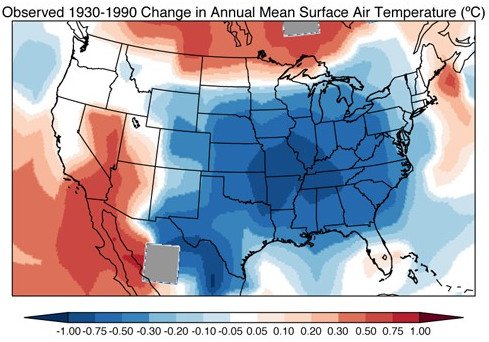Observed change in surface air temperature between 1930 and 1990. Observations are from the NASA GISS Surface Temperature Analysis. Image courtesy of Eric Leibensperger.
CAMBRIDGE, Mass., April 27 (UPI) -- U.S. researchers say pollution created a "warming hole" over eastern U.S. states, a cold patch where the effects of global warming were temporarily obscured.
Climate scientists at Harvard University said particulate pollution in the late 20th century "masked" the warming of the Earth's surface in the eastern United States by greenhouse gases like carbon dioxide and methane.
Tiny particles in the atmosphere can have a reverse effect on regional temperature scales, they said.
"What we've shown is that particulate pollution over the eastern United States has delayed the warming that we would expect to see from increasing greenhouse gases," lead author Eric Leibensperger said in a Harvard release Thursday.
However, with efforts to reduce particulate pollution there has been a regional "catch-up" of warming, he said.
"For the sake of protecting human health and reducing acid rain, we've now cut the emissions that lead to particulate pollution," he said, "but these cuts have caused the greenhouse warming in this region to ramp up to match the global trend."
For much of the late 20th century particulate pollution hung thick over the central and eastern states.
"What they do is reflect incoming sunlight, so we see a cooling effect at the surface," Leibensperger said.
The research emphasizes the importance of accounting for the climate impacts of particulates in future air quality policies, the researchers said.
"Something similar could happen in China, which is just beginning to tighten up its pollution standards," co-author Loretta J. Mickley said. "China could see significant climate change due to declining levels of particulate pollutants."















